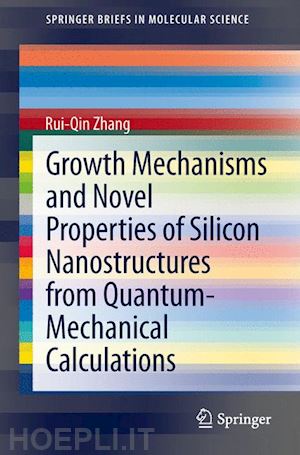
Questo prodotto usufruisce delle SPEDIZIONI GRATIS
selezionando l'opzione Corriere Veloce in fase di ordine.
Pagabile anche con Carta della cultura giovani e del merito, 18App Bonus Cultura e Carta del Docente
In this volume, Prof. Zhang reviews the systematic theoretical studies in his group on the growth mechanisms and properties of silicon quantum dots, nanotubes and nanowires, including: mechanisms of oxide-assisted growth of silicon nanowires, energetic stability of pristine silicon nanowires and nanotubes, thermal stability of hydrogen terminated silicon nanostructures, size-dependent oxidation of hydrogen terminated silicon nanostructures, excited-state relaxation of hydrogen terminated silicon nanodots, and direct-indirect energy band transitions of silicon nanowires and sheets by surface engineering and straining. He also discusses the potential applications of these findings. This book will mainly benefit those members of the scientific and research community working in nanoscience, surface science, nanomaterials and related fields.
Introduction.- Growth mechanism of silicon nanowires.- Stability of silicon nanostructures.- Novel electronic properties of silicon nanostructures.- Summary and remarks.
Prof. Zhang is currently a professor at the Department of Physics and Materials Science, City University of Hong Kong. Prof. Zhang’s research area is Computational Materials Physics and Chemistry, including: (1) energetics, kinetics and dynamics of materials nucleation and growth; (2) nano- and micro-structures and related properties of systems in materials science, surface science and chemistry; and (3) development of related methodologies and theories. His recent research focus is on nanoscience, including interactions of nanomaterials with chemical and biological systems, aiming at promoting the applications of nanostructured materials in energy-related and chemical, biological and environmental areas. He has published over 260 papers in internationally refereed journals and 5 book chapters in the areas of Chemical Physics, Materials Science, Condensed Matter Physics and Surface Science. His work has been cited more than 4000 times and his H-index has reached 32. Prof. Zhang hasbeen honored with (1) a Third-class State Natural Science Award of China in 1997, (2) a First-class Award of Scientific and Technological Development of China in 1997, (3) a Friedrich Wilhelm Bessel Research Award (http://www.avh.de/en/programme/preise/index.htm) from the Alexander von Humboldt Foundation, Germany in 2004, and (4) a Second-class State Natural Science Award of China in 2005.











Il sito utilizza cookie ed altri strumenti di tracciamento che raccolgono informazioni dal dispositivo dell’utente. Oltre ai cookie tecnici ed analitici aggregati, strettamente necessari per il funzionamento di questo sito web, previo consenso dell’utente possono essere installati cookie di profilazione e marketing e cookie dei social media. Cliccando su “Accetto tutti i cookie” saranno attivate tutte le categorie di cookie. Per accettare solo deterninate categorie di cookie, cliccare invece su “Impostazioni cookie”. Chiudendo il banner o continuando a navigare saranno installati solo cookie tecnici. Per maggiori dettagli, consultare la Cookie Policy.